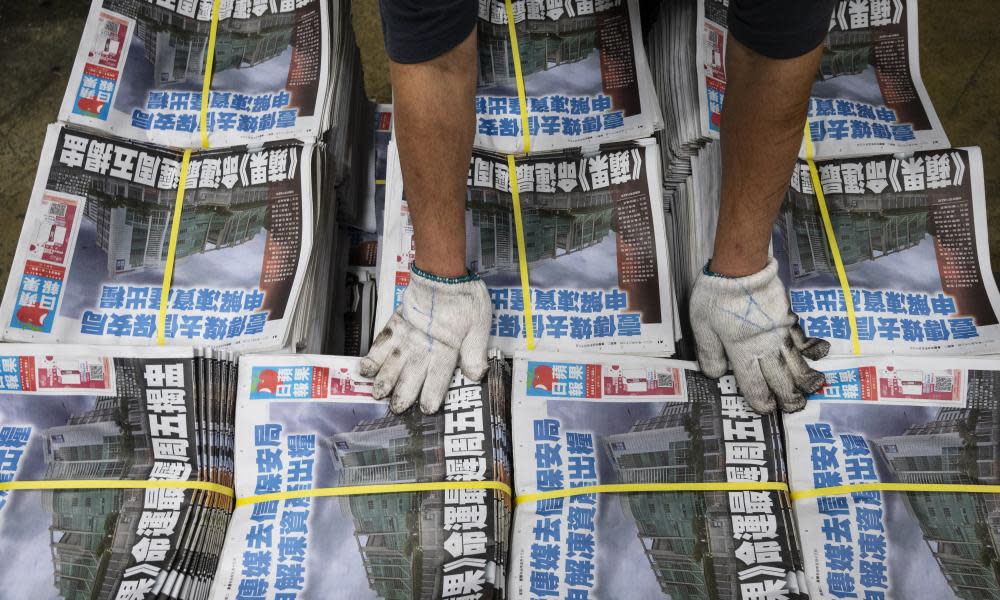Hong Kong leader refuses to say how media can avoid arrest in wake of Apple Daily raids

Hong Kong’s leader, Carrie Lam, has refused to clarify how journalists can avoid breaking the vaguely defined national security law following the raid and prosecution of journalists at a pro-democracy newspaper.
At a regular press conference on Tuesday the city’s chief executive, Carrie Lam, defended the arrest of senior Apple Daily executives under the national security law (NSL) – two of whom have been charged with conspiracy to commit collusion with a foreign country – as well as the raid of its newsroom and freezing of assets.
Apple Daily has said it will cease online publication this week unless its assets are unfrozen. On Tuesday it closed its English edition.
Related: Hong Kong’s Apple Daily could shut at weekend unless accounts are unblocked
Lam denied it was an attack on press freedom and said foreign criticism of the police operation, including from rights groups and world governments, was simply an attempt to recast acts that endangered national security.
“Don’t try to underplay to significance of breaching the national security law, and don’t try to beautify these acts of endangering national security,” she said. “Don’t try to accuse the Hong Kong authorities of using the national security law to suppress the media or stifle freedom of expression.”
Authorities said the raid and arrests related to more than 30 articles which called for foreign sanctions against the Hong Kong and Chinese governments. Authorities have refused to specify the articles in question, or say whether they were news or opinion.
Authorities have repeatedly refused to tell media how their work might breach the vaguely-defined law, including through publishing quotes, comments, or analysis by third parties.
Asked on Tuesday, Lam said “normal journalistic work would not endanger national security. She said the law was “very well defined” and “embraced all the important legal concepts”, but again gave no explanation of how it applied specifically to journalism.
“I believe media friends have the ability to grasp what kind of activities endanger national security,” she said. “It is fine to criticise the Hong Kong SAR government but if there is an intent or organising of activities to incite or subvert the government, that is another thing.”
Asked about the requests by Next Digital Media, Apple Daily’s parent company, to have their assets and accounts unfrozen so they could pay staff, Lam said the decision was up to the secretary of security.
Apple Daily, a vocal pro-democracy tabloid owned by activist and media mogul Jimmy Lai, has been a key target of the authorities’ its efforts to stifle Hong Kong’s press. Lai has been in jail since December, and is awaiting trial on three NSL charges. Hongkongers have bought copies of the paper in huge numbers, as an apparent show of support for the beleaguered title.
Thursday’s raid on the newsroom was the second in less than a year, and came with an unprecedented warrant to seize journalistic materials. It froze an estimated HK $18 million in assets, and locked accounts holding more than $500 million, according to Lai’s senior advisor, Mark Simon. The move, occurring before any prosecution had begun, left the company unable to pay future operational costs or wages.
The board of Next Digital told staff if the funds were not released, they would likely close the paper this week.
On Monday the title broadcast its final live news show online, thanking its audience and urging Hong Kong’s remaining media to stay steadfast and defend the truth, RTHK reported. On Tuesday it ceased its English-language service.
“This concludes the updates from Apple Daily English. Thank you for your support.”

 Yahoo Movies
Yahoo Movies 
